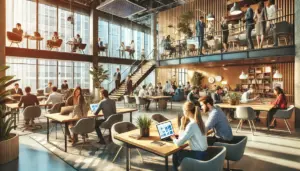Not too long ago, most people had just one option for work: a regular 9-to-5 job at a company office. You’d sit at the same desk, see the same people, and maybe even stay at the same company for years. But things have changed—a lot.

Now, more people are working remotely, freelancing, starting their own businesses, or finding jobs that let them set their own hours. The idea that work only happens in one place, at one time, is disappearing. And that’s a good thing.
Flexibility in work is no longer a luxury, it’s becoming a necessity. Let’s talk about why.
Work Isn’t Just About a Desk Anymore
For years, the traditional office was the default. You’d commute to work, sit at your desk, do your job, and go home. But technology changed everything. With laptops, smartphones, and high-speed internet, people can work from almost anywhere.
This shift became even more obvious when remote work exploded during the pandemic. Companies realized that employees didn’t need to be in the office to be productive. In fact, many people worked better from home—or from a Hollywood coworking space, for example, where they could focus and connect with other professionals in a creative setting.
Now, even though the pandemic is over, many workers don’t want to go back to the old way of doing things. And businesses are starting to listen.
Why People Want More Flexibility
The biggest reason people want flexible work? Freedom.
- Freedom to set their own schedules
- Freedom to work from different locations
- Freedom to have a better work-life balance
Instead of spending hours commuting, people can use that time for family, hobbies, or even just getting more sleep. And when people have control over their schedules, they’re often more productive—not less.
But flexibility isn’t just about remote work. Some people like going into an office, but they want the option to choose when and how often they go; this is why coworking spaces are rapidly growing in popularity. They offer a middle ground between working from home and sitting in a corporate office every day.
Businesses Are Catching On
At first, some companies resisted the idea of flexible work. They worried employees wouldn’t get enough done if they weren’t in the office. But the numbers tell a different story.
Studies have shown that flexible workers are more productive than their office-bound coworkers. Without office distractions or long commutes, people can focus better and work smarter.
Companies are starting to see the benefits, too:
- Lower costs – Fewer people in the office means companies can rent smaller spaces and save money.
- Happier employees – When workers have more control over their schedules, they’re less stressed and more engaged.
- Better talent – Businesses that offer flexible work options can hire from a wider pool of people, not just those who live near the office.
Because of this, more companies are offering hybrid work models, where employees split their time between home, the office, and coworking spaces.
Freelancers and Entrepreneurs Need Flexibility Even More
Not everyone works a 9-to-5 at a big company. More people are freelancing, starting their own businesses, or juggling multiple jobs. For them, having the freedom to choose when and where they work isn’t just nice—it’s a must.
Freelancers are constantly balancing different clients, deadlines, and even time zones. Some days, they need quiet focus at home. Other times, they need a café for a change of scenery or a coworking space to meet clients and make connections.
Entrepreneurs benefit from flexibility too. Renting an office can be expensive, especially for small businesses just starting out with a minimal budget. Coworking spaces give them a professional setup without the commitment of a long lease, plus a built-in network of other business owners and creatives. It’s an affordable way to grow without taking on major costs upfront.
Why Coworking Spaces Are Booming
Coworking spaces are taking off because they offer the best of both worlds—flexibility without the isolation of working alone. They come with everything professionals need:
- Fast WiFi, meeting rooms, and office essentials
- A work-friendly environment without a long-term contract
- A built-in community of other freelancers, entrepreneurs, and remote workers
In a city like Los Angeles, where creatives, startups, and independent professionals thrive, coworking spaces make it easy to stay productive while being part of a larger network. They also give people a sense of structure without the rigidness of a traditional office.
What’s Next for the Future of Work?
Work is shifting fast, and there’s no going back. More companies are embracing hybrid models. More people are choosing flexibility over fixed schedules. And more workspaces are popping up to meet the demand.
The future of work isn’t about one-size-fits-all. It’s about options—choosing when, where, and how to work in a way that makes sense for each person.
Whether it’s from home, a shared space, or a traditional office, one thing is clear: flexibility isn’t just the future—it’s already here.




Leave a Reply